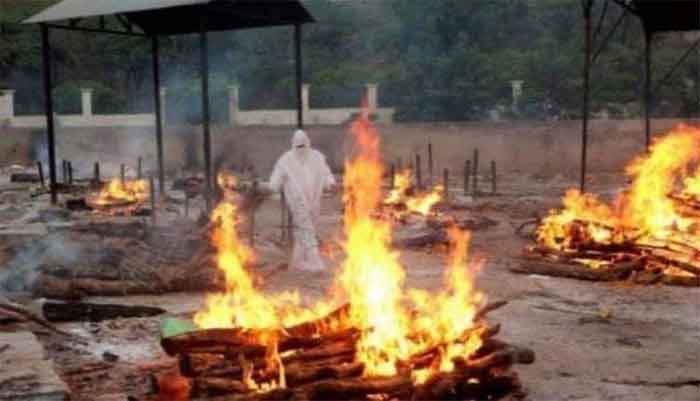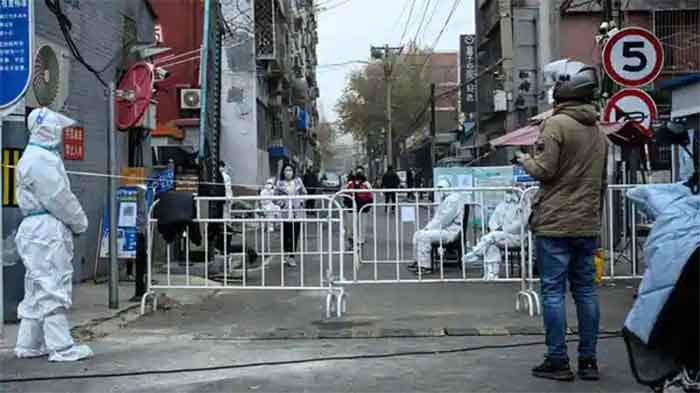
The global death toll from the coronavirus pandemic has topped 3 million people amid repeated setbacks in the worldwide vaccination campaign and a deepening crisis in countries like Brazil, India and France. World Health Organization (WHO) says pandemic is at a critical point.
The number of deaths, compiled by Johns Hopkins University, is about equal to the population of metropolitan Lisbon, Portugal and is greater than the population of Western Australia.
The actual global death toll is believed to be significantly higher because of possible government concealment and many cases overlooked in the early stages of the outbreak, which began at the end of 2019.
Deaths are on the rise again worldwide, running at about 12,000 per day on average, and new cases are climbing too, eclipsing 700,000 a day.
When the world passed the bleak threshold of 2 million deaths in January, immunization drives had just started in Europe and the U.S.
Today, immunization drives are underway in more than 190 countries, though progress in bringing the virus under control varies widely.
While the campaigns in the U.S. and Britain have hit their stride and people and businesses there are beginning to contemplate life after the pandemic, other places, mostly poorer countries but some rich ones as well, are lagging behind and have imposed new lockdowns and other restrictions as virus cases soar.
“This is not the situation we want to be in 16 months into a pandemic, where we have proven control measures,” said Maria Van Kerkhove, one of the World Health Organization’s leaders on COVID-19.
In Brazil, where deaths are running at about 3,000 per day, accounting for one-quarter of the lives lost worldwide in recent weeks, the crisis has been likened to a “raging inferno” by one WHO official.
A more contagious variant of the virus has been rampaging across the country.
Situation is dire in Brazil and India
The slow vaccine rollout has crushed Brazilians’ pride in their own history of carrying out huge immunization campaigns that were the envy of the developing world.
Taking cues from President Jair Bolsonaro, who has likened the virus to little more than a flu, his Health Ministry for months bet big on a single vaccine, ignoring other producers.
When bottlenecks emerged, it was too late to get large quantities in time.
The situation is similarly dire in India, where cases spiked in February after weeks of steady decline, taking authorities by surprise.
In a surge driven by variants of the virus, India saw more than 180,000 new infections in one 24-hour span during the past week, bringing the total number of cases to more than 13.9 million.
Problems that India had overcome last year are coming back to haunt health officials. Only 178 ventilators were free on Wednesday afternoon in New Delhi, a city of 29 million, where 13,000 new infections were reported the previous day.
The challenges facing India reverberate beyond its borders since the country is the biggest supplier of shots to COVAX, the UN-sponsored program to distribute vaccines to poorer parts of the world.
Last month, India said it would suspend vaccine exports until the virus’s spread inside the country slows.
Vaccine supply situation is precarious
The WHO recently described the supply situation as precarious. Up to 60 countries might not receive any more shots until June, by one estimate.
To date, COVAX has delivered about 40 million doses to more than 100 countries, enough to cover barely 0.25 per cent of the world’s population.
Globally, about 87 per cent of the 700 million doses dispensed have been given out in rich countries. While 1 in four people in wealthy nations have received a vaccine, in poor countries the figure is 1 in more than 500.
U.S. deaths down to 700 per day, French hospitals struggle
In the U.S., where more than 560,000 lives have been lost, accounting for more than 1 in six of the world’s COVID-19 deaths, hospitalizations and deaths have dropped, businesses are reopening, and life is beginning to return to something approaching normal in several states.
But progress has been patchy, and new hot spots — most notably Michigan — have flared up in recent weeks.
Still, deaths in the U.S. are down to about 700 per day on average, plummeting from a mid-January peak of about 3,400.
Europe
In Europe, countries are feeling the brunt of a more contagious variant that first ravaged Britain and has pushed the continent’s COVID-19-related death toll beyond 1 million.
Close to 6,000 gravely ill patients are being treated in French critical care units, numbers not seen since the first wave a year ago.
Marc Leone, head of intensive care at the North Hospital in Marseille, said exhausted frontline staff who were feted as heroes at the start of the pandemic now feel alone and are clinging to hope that renewed school closings and other restrictions will help curb the virus in the coming weeks.
Vaccine equity the challenge of our time, and we are failing, says WHO chief
With the number of new COVID-19 cases nearly doubling over the past two months, approaching the highest infection rate the world has seen during the pandemic, the unequal distribution of vaccines is not only a moral outrage, but economically and epidemiologically self-defeating, the head of WHO, the UN health agency, told a special ministerial meeting of the Economic and Social Council (ECOSOC) on Friday.
The summit – held in virtual format on the theme, “A Vaccine for All” – brought together senior officials from the UN, government, business, the scientific community and civil society, who explored ways to guarantee equal access to the vaccine as a global public good, and to strengthen countries’ readiness for its distribution.
“Vaccine equity is the challenge of our time”, Tedros Adhanom Ghebreyesus, Director-General of the WHO told the gathering in opening remarks. “And we are failing.”
Sharp disparities
Driving that point home, he said that of the 832 million vaccine doses administered, 82 per cent have gone to high or upper middle-income countries, while only 0.2 per cent has been sent to their low-income peers. In high-income countries alone, one in four people have received a vaccine, a ratio that drops precipitously to 1 in 500 in poorer countries.
Rapidly spreading variants, the inconsistent use and premature easing of public health measures, fatigue with social restrictions and the “dramatic” inequity in vaccine coverage; all have led to an alarming spike in new cases and deaths, he said.
‘Partnership, not patronage’
“This is a time for partnership, not patronage,” he stressed. “We have the tools to end this pandemic.”
The Access to COVID-19 Tools Accelerator, created by WHO and its partners, along with the COVAX Facility, can prevent mistakes of the past – when the world 40 years ago was slow to deploy lifesaving antiretrovirals to poor countries during the HIV and AIDS crisis.
Today, he said that while COVAX has distributed 40 million doses to 100 countries, this is nowhere near enough. WHO had expected to distribute 100 million doses by now. Some countries have received nothing, none have received enough, and some are not receiving second-round allocation on time. “The problem is not getting vaccines out of COVAX,” he assured. “The problem is getting them in.”
WHO is working with the Gavi, the Vaccine Alliance and the Coalition for Epidemic Preparedness Innovations to ramp up production and supply, he said.
A COVAX manufacturing task force has been formed, and promisingly, a New Partnership for African Manufacturing will be formed by the African Union. It aims to build five vaccine production hubs on the continent, starting with three mRNA facilities in Rwanda, Senegal and South Africa. WHO is also developing regional regulatory capacity through the African Medicines Agency.
Tedros called on countries with enough vaccines to cover their populations “many times over” to make immediate donations to COVAX. More broadly, it is vital to explore every option for boosting production – including voluntary licenses, technology pools and the waver of certain intellectual property provisions – and to invest in local vaccine manufacturing.
WHO will continue to provide technical assistance and add manufacturing bases across Africa, Asia and Latin America.
Never in its 75-year history has the role of the UN been more important. “We cannot defeat this virus one country at a time,” he said. “We can only do it with a coordinated global effort, based on the principles of solidarity, equity and sharing.”
WTO: Practical solutions
Ngozi Okonjo-Iweala, Director General of the World Trade Organization (WTO), called such disparities “morally unconscionable.” Addressing inequity is a task that confronts the world with daunting technical, logistical, policy and political hurdles.
However, they can be overcome in a practical, empirically informed manner. While she said the impulse to conserve supply is understandable, securing personal safety is not enough. “We must find a way to share”, she insisted.
A recent WTO vaccine equity event had some encouraging takeaways, she said, making clear that there is untapped potential in developing countries to ramp up production, and that resources are available to bankroll such investment. WTO members have reduced export restrictions from 109 in nearly 90 countries, to 51 in 62 countries, and with pragmatic engagement, she said they can find ways to bridge intellectual property rights concerns.
Universal coverage: The only way out
Munir Akram, President of ECOSOC, stressed that in addition to being a moral imperative, universal vaccine coverage is the only realistic way out of the pandemic.
He called for ramping up production, addressing intellectual property issues, supporting weak health systems in developing countries, removing export restrictions – and importantly – funding the WHO ACT Accelerator and COVAX facility. Decisive steps towards universal access is a prerequisite for economic recovery, he assured.
‘Multilateralism at its finest’
“No topic is as relevant or pertinent to the world today as that of vaccines”, said Volkan Bozkir, President of the General Assembly. “Our efforts have not been perfect,” he acknowledged. “We must finish what we have started.”
He pressed Governments to recommit to the principles of human solidarity and cooperation, stressing that progress made to date is the result of countries working with hundreds of companies and thousands of scientists – “multilateralism at its finest.”
Towards the goal of “vaccines for all” he also urged countries to extend resources to COVAX; invest in vaccine research, production and distribution; donate vaccines to countries in need and tackle misinformation to ensure everyone is educated on the benefits of inoculation.
“It is job of United Nations and is Member States to act on these demands”.
Covid-19 infection rate approaching highest of pandemic so far, says WHO chief
The number of new Covid-19 cases per week has nearly doubled globally over the past two months, approaching the highest rate seen so far during the pandemic, the head of the WHO said on Friday.
“Cases and deaths are continuing to increase at worrying rates,” Tedros Adhanom Ghebreyesus said in a briefing focused on Papua New Guinea (PNG) and the western Pacific region.
He said he was very worried about the potential for a much larger epidemic in PNG, and it was vital the country received more Covid-19 vaccines as soon as possible.
PNG has now reported more than 9,300 Covid-19 cases and 82 deaths.
PNG health minister Jelta Wong said there was on ongoing challenge in the country to get people wearing masks and disbelief about the disease itself, which would complicate efforts to roll out vaccines.
GET COUNTERCURRENTS DAILY NEWSLETTER STRAIGHT TO YOUR INBOX















































